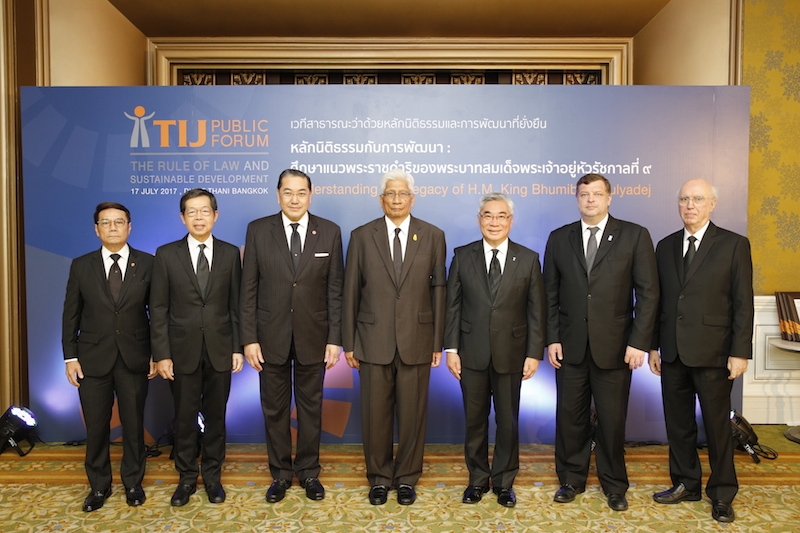Thailand Institute of Justice Hosts A Public Forum on the Rule of Law and Sustainable Development:Understanding the Legacy of H.M. King Bhumibol Adulyadej
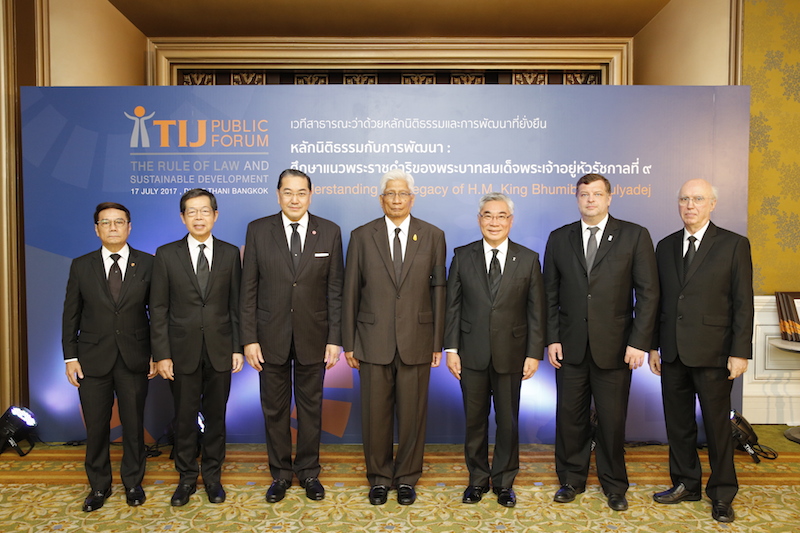
Bangkok -17 July 2017 – The Thailand Institute of Justice (TIJ) has hosted the 3rd TIJ Public Forum on "The Rule of Law and Sustainable Development: Understanding the Legacy of H.M. King Bhumibol Adulyadej." It featured insights and perspectives from experts and professionals in various fields, as well as case studies relating to three key issues: 1) Sustainable Coexistence between Man and Forest Through the Lens of the Rule of Law: Case Study of Nan Province; 2) The Rule of Law on Informal Debt Management Through Establishing Community-based Financial Institutions; and 3) The Rule of Law on Regulatory Sandbox for Managing Disruptive Technologies. The case studies were presented by representatives of executives who attended the first batch of the TIJ Executive Program on the Rule of Law and Development (RoLD). The RoLD program focuses on the role of law in fostering justice and equality in society, and not only lawyers who can make a difference. Every part of society should be aware of and get involved in helping to develop a sustainable Thailand in line with H.M.'s initiatives.
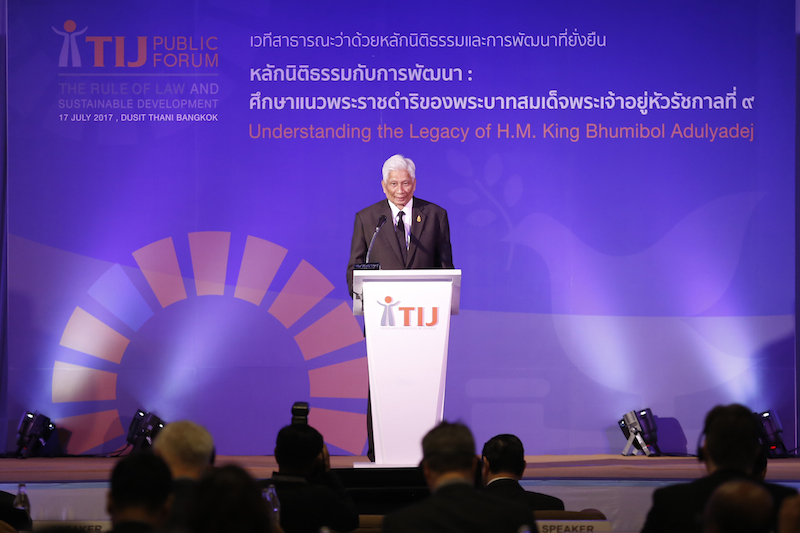
H.M. King Bhumibol Adulyadej's accession oath stated: "We shall reign in righteousness for the benefit and happiness of Siamese people." Part of his speech to barrister-at-law graduates in 1981 stated: "Law is not justice, it is a tool to maintain and facilitate justice. Law enforcement is to keep the justice, not the legal provision. Keeping justice is not limited to legal boundaries, but includes morality and factual rationality as well." This shows H.M.'s genius and thorough comprehension of the rule of law before there was wide awareness of the topic. H.M.'s actions throughout the 70 years under his reign reflected H.M.'s efforts to implement his initiatives to provide material results for Thai people.
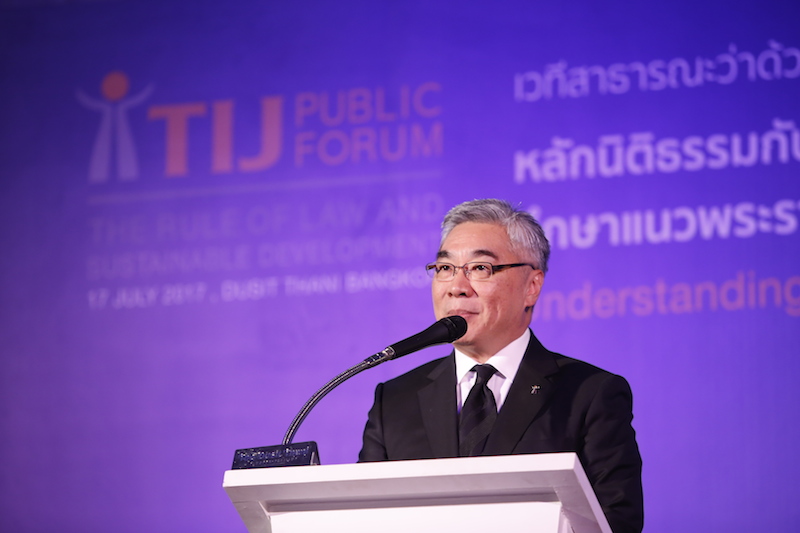
Professor Dr. Kittipong Kittayarak, Executive Director, Thailand Institute of Justice, said, "One of TIJ's missions as the first Thai organization in ASEAN recognized by the United Nations Crime Prevention and Criminal Justice Program Network Institutes (UN-PNI) is to promote the rule of law and equal access to justice for a peaceful society. This is in line with the 16th and 17th goals of the UN's Sustainable Development Goals (SDGs), as TIJ is aware that peace and justice, and efficient governing based on human rights, are an essential foundation for other aspects of development. This is why TIJ places importance on building awareness and understanding for society at large, and promotes an inclusive society where everyone realizes the rule of law is relevant to them and is a basic foundation for all aspects of sustainable development."
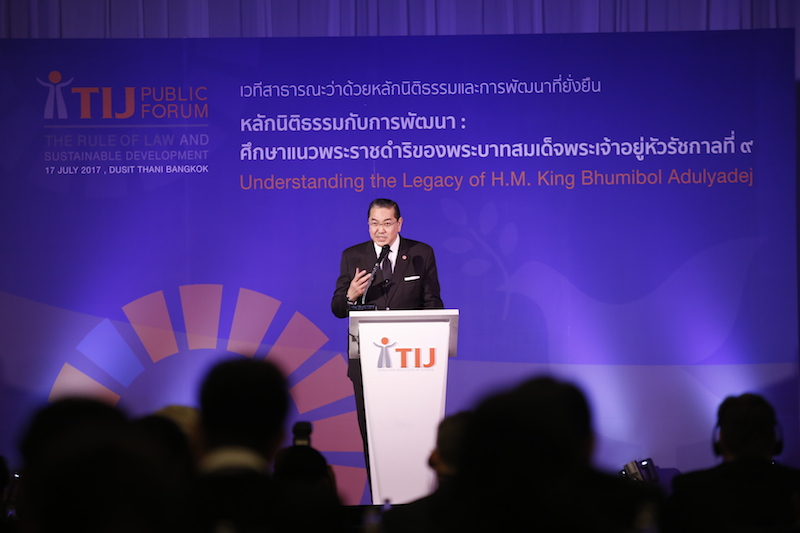
The public forum reflected the new learning approach for the rule of law and sustainable development. It is part of TIJ's Executive Program on the Rule of Law and Development (RoLD Program), in conjunction with Harvard Law School's Institute of Global Law and Policy, to promote ongoing learning and strengthening the network of Thai and international professionals, so that the rule of law can be successfully and practically implemented helping to end injustice in society.
The TIJ Public Forum on The Rule of Law and Sustainable Development promoted an exchange of knowledge and awareness about the links between the rule of law and sustainable development through the involvement of many related parties and professionals. In view of interdisciplinary perspectives, understanding and driving for sustainable development could be mutually achieved in the future.
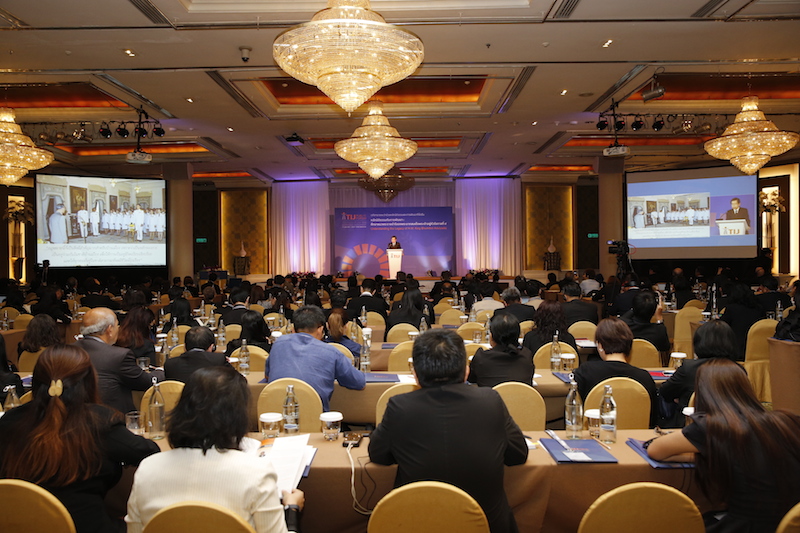
The TIJ Public Forum aims to draw lessons about the rule of law as a tool for sustainable development. Lessons can be drawn from H.M.'s initiatives through the royal projects recognized internationally. Undertaking these projects involves laws and regulations, and enforcement, which could be a problem or obstacle for a project's development. However, with H.M. focusing on the rule of law as a tool to interpret related law and regulations based on people-focused development, the royal projects have followed a successful path and have become models for other projects to learn from.
"Today's society is more complicated and dynamic in many ways. There are times when the existing processes and laws may not be able to fully facilitate justice to take place. Some cannot cope with the speed of changes, while others become an obstacle to equality or development. There are also problems with law enforcement. The challenge is how to develop laws in line with the modern world, then enforce them appropriately by the rule of law principle, which will lead to sustainable development and fairness in society," added Professor. Dr. Kittipong.
Experts from leading organizations who participated in the TIJ Public Forum on the Rule of Law and Sustainable Development: Understanding the Legacy of H.M. King Bhumibol Adulyadej included Mr. Martin Hart-Hansen, Deputy Resident Representative, United Nations Development Programme (UNDP) in Thailand; Dr. Sandro Calvani, Senior Advisor on Strategic Planning, Mae Fah Luang Foundation Under Royal Patronage; Professor Dr. Surakiart Sathirathai, Former Deputy Prime Minister and Former Minister of Foreign Affairs; Dr. Prasarn Trairatvorakul, Member of the Board of Directors, Thailand Sustainable Development Foundation; Dr. Kobsak Pootrakool, Vice Minister for the Prime Minister's Office; Mr. Weerasak Kowsurat, Former Minister of Tourism and Sports and Advisor, Electronic Transactions Development Agency; Dr. Prawit Leesatapornwongsa, Commissioner, Office of the National Broadcasting and Telecommunications Commission; Mr. Chonlatid Suraswadi, Director General, Royal Forest Department; and Ms. Sarinee Achavanuntakul, Managing Director, Sal Forest Co., Ltd.
Representatives of the first batch of executives who took part in the TIJ Executive Program on the Rule of Law and Development (RoLD) presented the results of their field research and interviews with stakeholders on three issues: Overlapping of forest and farming areas; Is fair debt possible; and the Regulatory Sandbox for managing disruptive technologies. They also presented suggestions and exchanged views with the panelists and participants to further define improvements to the justice process which could lead to sustainable development.
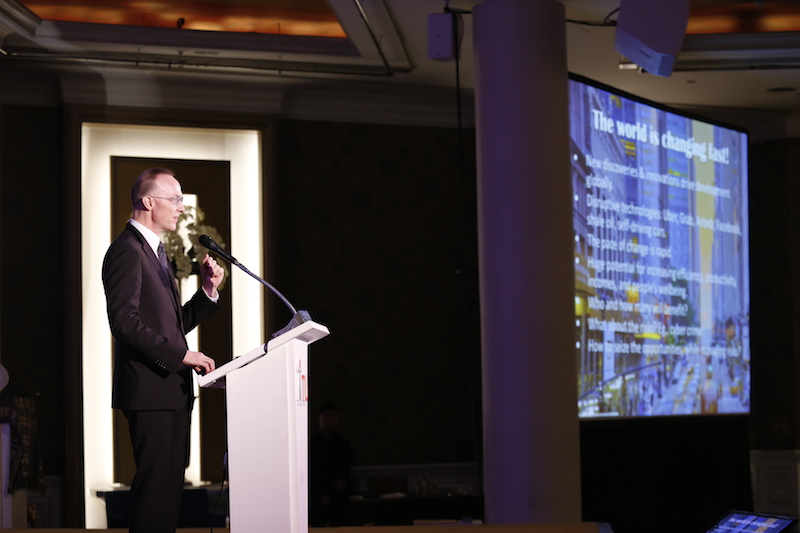
Sustainable Coexistence between Man and Forest through the Lens of the Rule of Law: Case Study of Nan Province
The forest area in Nan province has a complicated connection to the poverty problems in that area, due to unfairness and inequality resulting from unsustainable development. Big interest groups took advantage of the villagers, and, as their land rights were not endorsed by law, they lacked the potential to develop themselves. This led to a vicious cycle of deforestation along with increasing debt. Related government organizations then had to be very careful, and did not have confidence in the villagers' ability to handle the natural resources in overlapping areas on a sustainable basis. Trust between the villages and government lead to conflicts that became ongoing and posed difficulties in finding an easy solution.
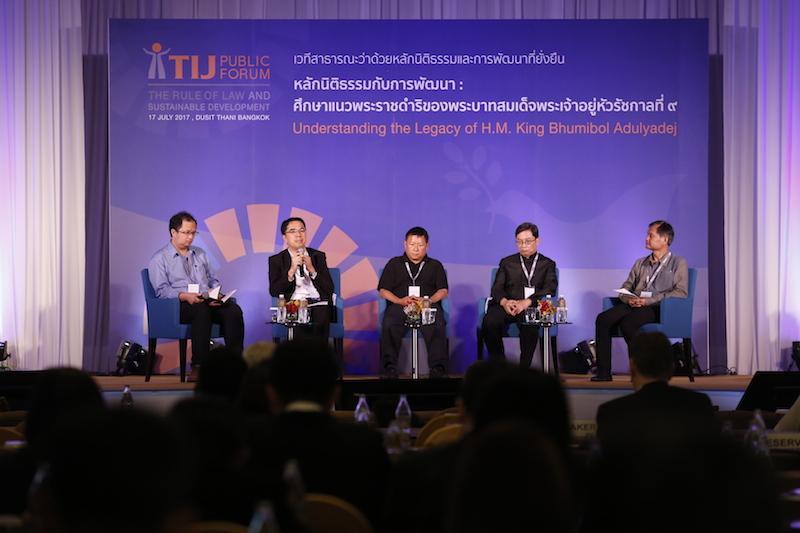
This is not a new problem in Thailand. There has actually been a successful case of resolving a problem through H.M.'s initiatives and the royal projects under his patronage, enforcing the law based on the rule of law principle for sustainable development. Successful projects such as the Royal Projects, Doitung Project, and others, have shown that enforcement should not be only from top-down through the Constitution and other related laws. It requires a rule of law system that includes the villagers in the area. There should be a mutual agreement on co-existence, plus mutual governing and management with officers in the area. This will create a culture of mutual respect and justice mechanisms in the community allowing sustainable co-existence of humans and the forest. This approach has been applied in other areas such as Huay Pla-lod in Tak province, and helped to resolve overlapping land issues.
Suggestions for a solution: Action framework for resolving overlapping areas for sustainable co-existence of man and forest, based on King Bhumipol's Science, has four steps:
- Preparation of the community: The community should learn key principles for balance and sustainability based on King Bhumipol's Science.Key principles for preparing the community to self-manage forest resources on a sustainable basis should be taken into account. This includes the "growing trees in people's hearts" principle by building awareness about the importance of the forest and sustainable co-existence. According to His Majesty's speech, "Trees should first be grown in people's minds, then those people will grow trees on the land and protect the trees themselves." Then, preparation for other aspects follows, such as engagement with the local community to manage the area using an "inside out" approach, and the management of soil, water, and forests in line with the area's geo-social environment. The Sufficiency Economy principle will help in managing the economy and resources in an appropriate and rational way in which they are well protected. All of these will help prepare the community to cope with changes in economic and social conditions in a sustainable way.
- Determine the framework for area management by engaging the community, related government departments, and other supporting organizations. This will lead to mutual consideration in managing the target area.There should be joint development of a plan, taking into consideration the Constitutional Law, Forest Act, and local regulations. The area can be co-managed by determining the size, boundaries, and co-ordinates by using technology and a transparent and systematic proof of rights. The stakeholders must also be clearly defined for the community, related government departments, and supporting organizations. Also, the plan should include balanced and sustainable use of the area based on King Bhumipol's Science.
- Take actions as planned, and follow up and review the progress. Have a co-oversight mechanism in place through existing law, for example, Article 19 of the Forest Act, announcing the area to be co-managed by the community and the local forest authority.
- Manage knowledge and draw lessons to help resolve future problems. This can become a case-based practice to resolve problems in other areas.
This suggested approach is a new dimension for law enforcement, where the law is not an obstacle to development. The perception about the problem has been changed. People who were once considered encroachers and victims of injustice have now become forest guardians. They have more choices in life that are suitable for the area's economic and social context. The approach helps to foster trust and co-operation among villagers, government agencies, and professionals in the justice system including the police, prosecutors, and the court. It is in line with a proposal to reform the laws related to a community-based collective system of forest administration. Lastly, the approach will further spread King Bhumipol's work principles systematically as the key way to resolve problems, and to develop sustainability and justice in Thai society
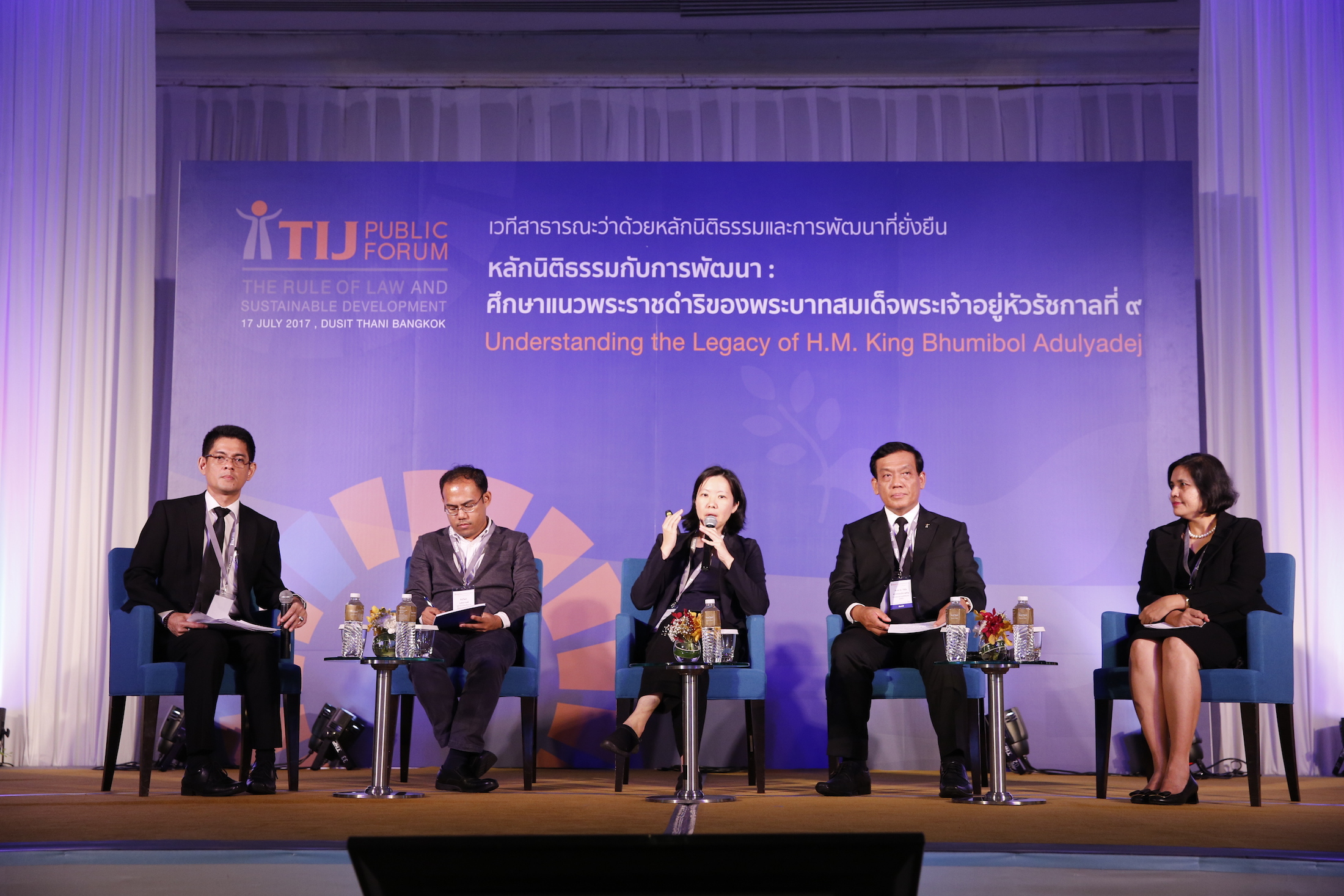
The Development of Fair Debt in a Society Based on Rule of Law
The problem of insolvency and informal debt of people in society reflects a widespread problem of inequality and injustice. The fact that people with a lower income find it difficult to access capital and credit sources in the system forces them to act in a manner in which they inevitably encounter risks. For example, moneylenders take advantage of these people by demanding interest rates that are not transparent or exceed those specified by law. They may also be forced to commit to unfair agreements. Even worse, they may suffer from violence during debt collection. Such problems do not only affect debtors and their families. In many cases, they are also problems for the whole community or personnel in an entire organization. These factors will certainly have an impact on the country's development.
Debt problems also reflect the problem of inequality in Thai society in many dimensions, including income, knowledge, and access to opportunity, as well as access to the process of judgment. This leads to the question "What should be done to create sustainable solutions to debt problems, allow access to a fair credit system, equip debtors with discipline and accountability, and foster a life philosophy of sufficiency economy so that people in society are less vulnerable and do not easily fall victim to unfair debt?" The key to solving this problem is encouraging all sectors to value the importance of and participate in solving the case study issues.
From the in-depth study of such issues, proposals for resolving them include:
- Helping people, particularity the lower income group, to access credit sources in the system easily, without adding to the risk and cost for creditors, while providing people with knowledge about financial and consumer protection. This will help ensure greater balance when creditors and debtors enter a mutual agreement.
- Reducing creditors' risks and the burden from debt collection. This can be achieved by developing a fair credit system for appropriate projects to reduce the problems of informal debt and develop an assessment system for the effective use of capital as well as sustainable development.
- Controlling informal creditors who use violence and take advantage of debtors by using appropriate mechanisms. This can be achieved by law enforcement, with the organizations responsible for finance and credit systems as well as justice agencies able to suppress offenders strictly, while developing an assistance system to provide justice for debtors who are taken advantage of and treated unfairly when they enter an agreement, before prosecution, and in the legal execution process, efficiently and in a timely manner.
- The role of the government in making people aware of their spending in alignment with the sufficiency economy and developing community financial funds. This can be accomplished by encouraging people to live their lives under the sufficiency economy philosophy. They can also be trained to manage their families' and communities' financial systems to avoid getting into unfair debt. The key method is allowing all sectors to foresee the importance and contribute to problem solving.
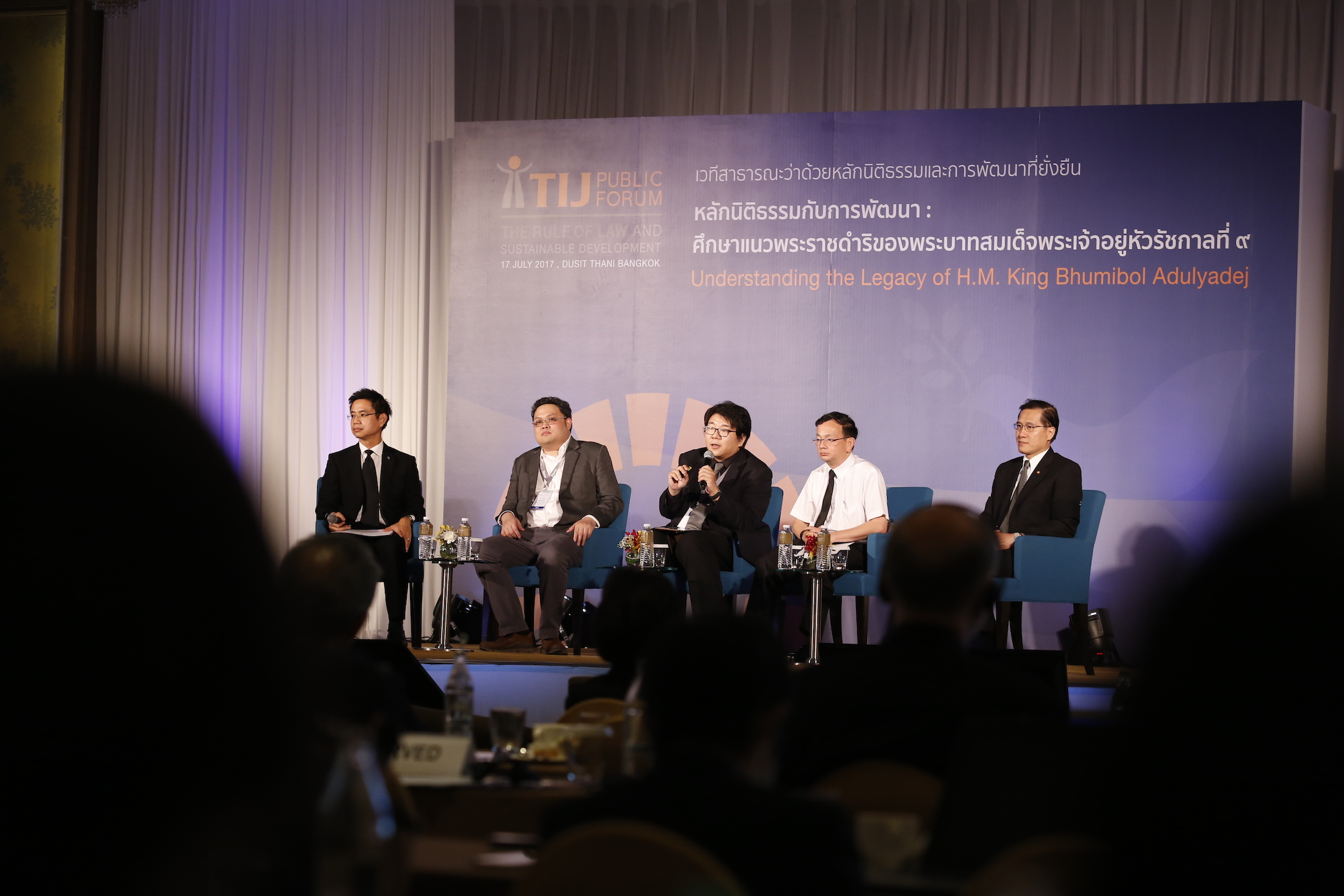
Alternatives for Disruptive Technology Through the Role of Law and a Regulatory Sandbox
The Thailand 4.0 initiative encourages an economy driven by innovation and modern technology to develop the country. At the same time, the trend of innovative services such as Fintech, Airbnb, Uber, and Grab, known as "disruptive technologies," are growing quickly as they perfectly fit the needs of consumers in present-day society.
The introduction of innovative products and services leads to perspectives that reflect the incompatibility of laws, regulations, and government agencies' policies that must adapt to changes resulting from disruptive technology. The concept of a Regulatory Sandbox, under the philosophy of the Sharing Economy, has been accepted in and adopted by many countries in different contexts. It serves as an experimental test bed to find solutions by incorporating the role of law in the management of innovative services based on disruptive technology that can impact society, so using innovations to drive the country's economy in accordance with the government's policy will not lead to any conflicts or obstacles.
This will benefit small business operators who rely on technology as an important tool for managing their business, as well as create a balance of benefits for stakeholders in all sectors of society and the nation, while also promoting national security. Furthermore, the success of the Regulatory Sandbox will also serve as a prototype for resolving issues among various sectors for other topics in the future.
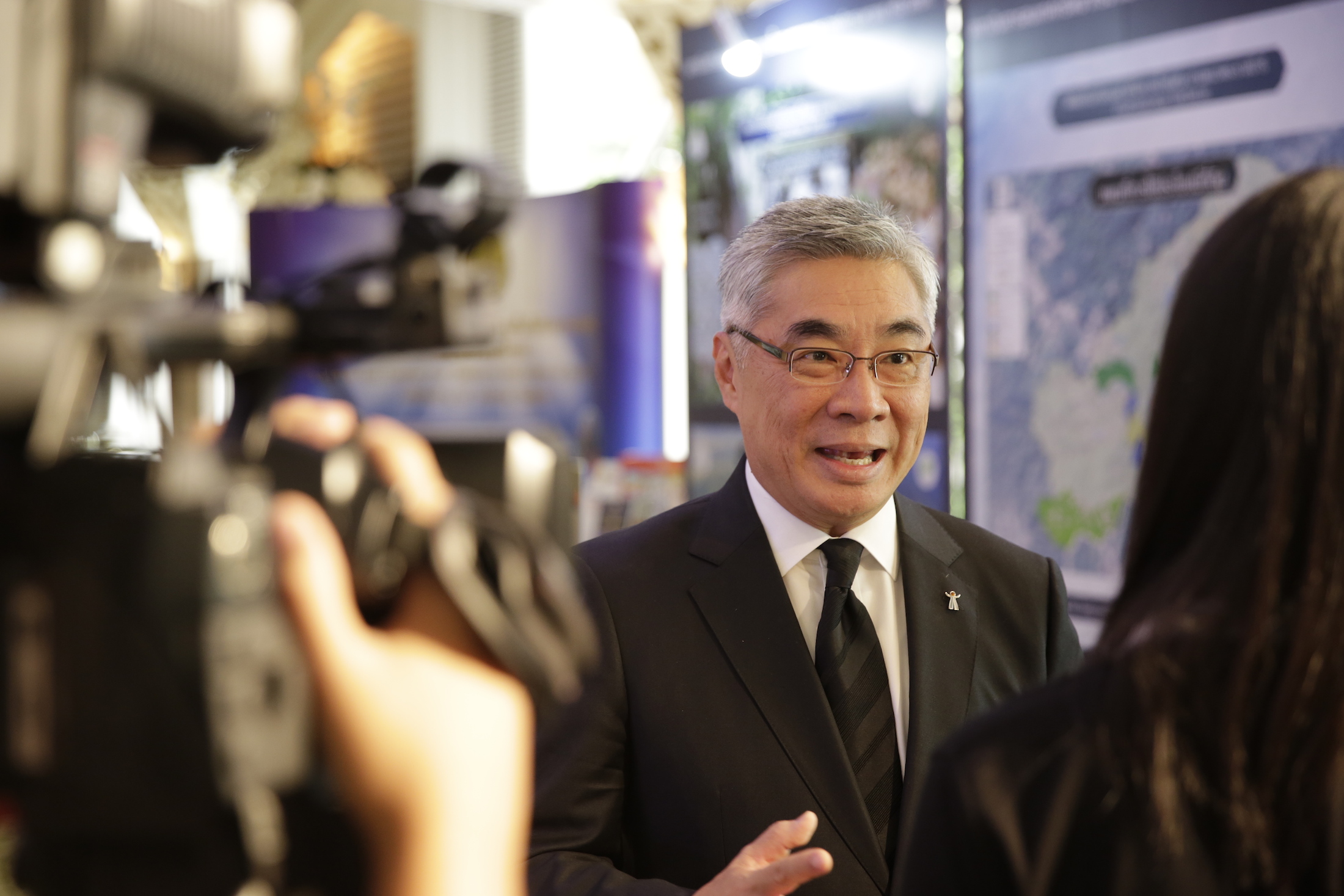
Professor Dr. Kittipong summarized, saying, "Hosting a public meeting on the topic of the rule of law and sustainable development, and discussing the issues in society in order to find a common solution, is seen as a good start. I am honored that our distinguished participants could join us to share their perspectives, which are beneficial to all of us. I would like to express my thanks to the first management batch of the TIJ Executive Program on the Rule of Law and Development (RoLD) for their contribution of the knowledge and concepts derived from the joint study and the adoption of the rule of law in practice, striving to resolve key issues in society in a substantial manner. This includes trespassing in forests, informal debt, and new challenges resulting from the growth of disruptive technology. The study was conducted through the perspective of operators from various sectors, and not only limited to the legal perspective."
"I truly hope that our adaptation of the royal initiatives by His Majesty King Rama IX for this public meeting today will foster greater awareness of the connection between the rule of law and development. This will encourage acknowledgement by the public and other related sectors in integrating the rule of law into all aspects of living, while serving as the basis for driving Thailand forward on a stable and sustainable scale," added Professor Dr. Kittipong.
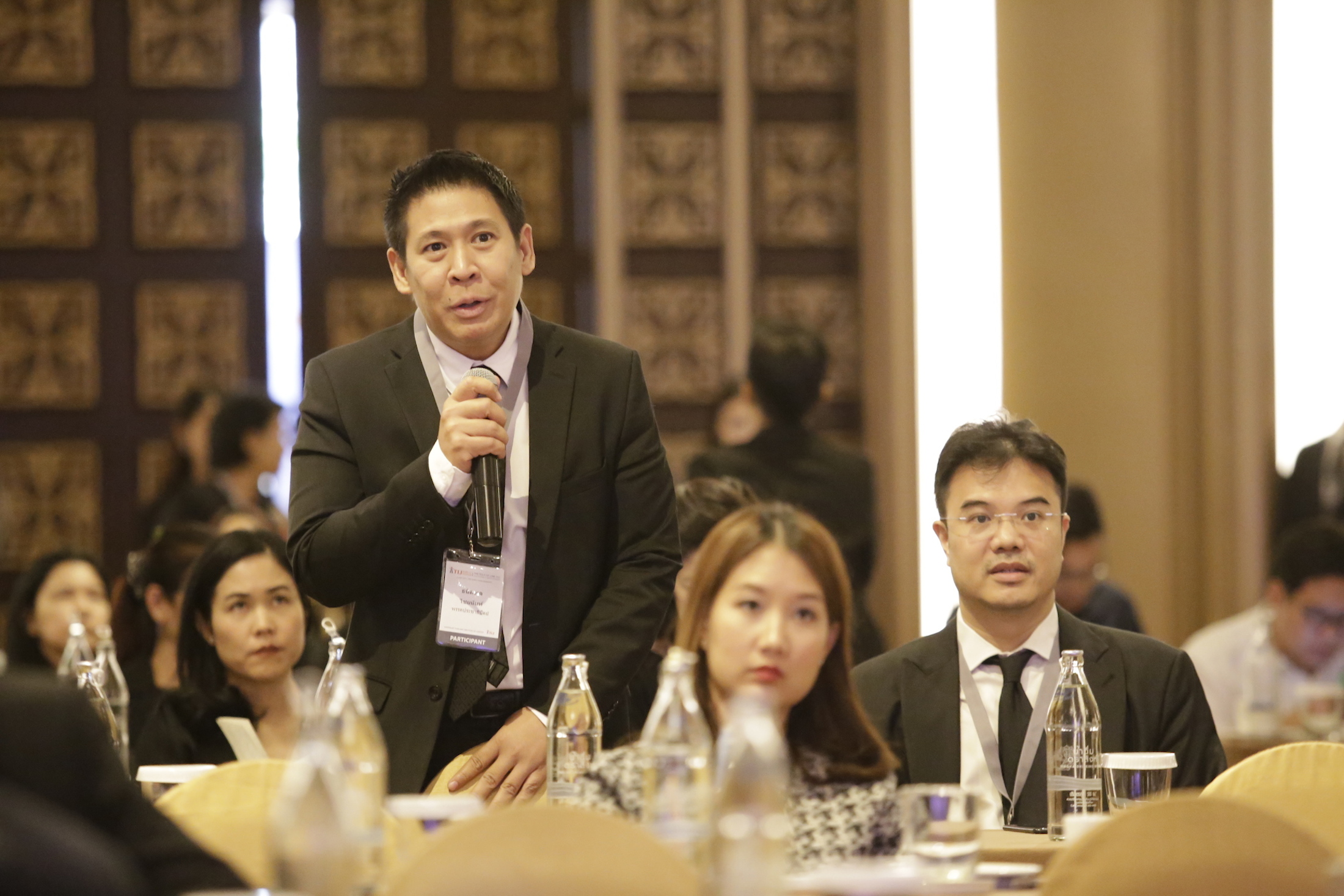
This is the third time the Thailand Institute of Justice (TIJ) has organized a public meeting. In the first two meetings, TIJ emphasized issues reflecting the importance of the rule of law related to sustainable development, A.D. 2030, as well as the essential role the rule of law serves in international development, human rights, and community development. This all reinforces the need for everybody to be aware that the rule of law is not only the objective for sustainable development on its own, but also a factor that contributes to the success of other targets for development.



